Exploring the Connection Between Mushrooms for Prostate Cancer and Cognitive Function
In recent years, there has been growing interest in the medicinal potential of functional mushrooms, especially in their roles supporting cognitive function and cancer management. Among the most compelling areas of research is the investigation into mushrooms for prostate cancer and how their bioactive compounds might offer both neuroprotective and anticancer benefits. While no mushroom has been definitively proven to cure cancer, emerging scientific findings suggest that certain nootropic mushrooms, including turkey tail, lion’s mane, and reishi, may have valuable complementary roles in supporting prostate health and enhancing mental clarity. This convergence of traditional knowledge and modern science has opened up new avenues for natural health interventions that are both promising and nuanced.
You may also like: The Ultimate Guide to the Best Nootropic Mushrooms for Memory and Cognitive Enhancement
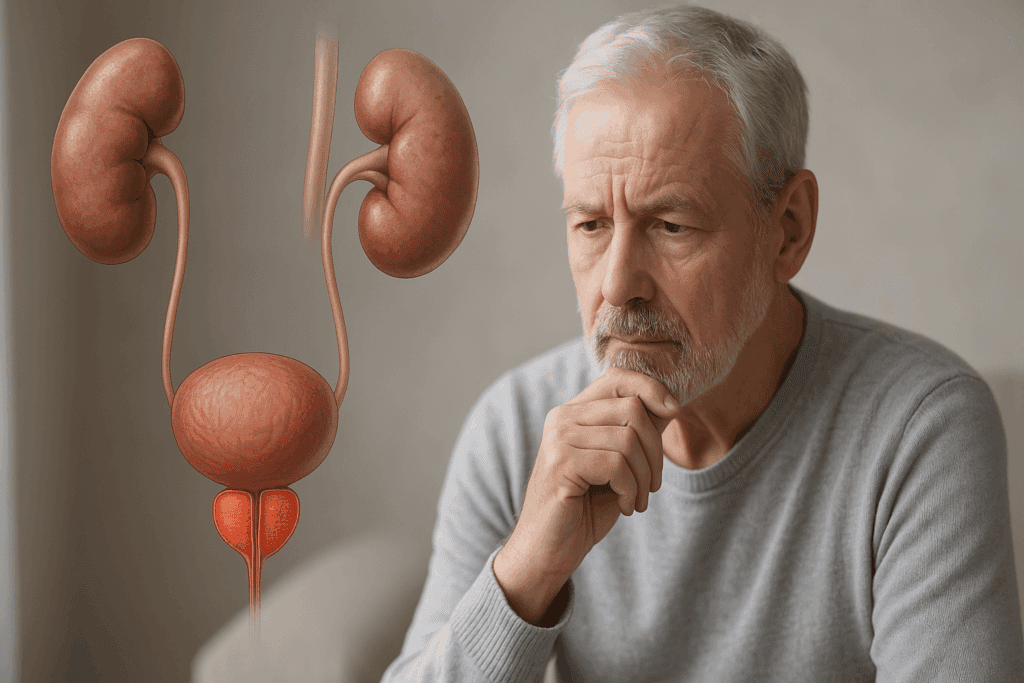
Understanding Prostate Health: A Growing Concern for Aging Men
The prostate, a small gland that plays a vital role in the male reproductive system, becomes increasingly susceptible to disorders as men age. Conditions such as benign prostatic hyperplasia (BPH), prostatitis, and prostate cancer are common and can significantly impact quality of life. Prostate cancer, in particular, is the second most common cancer among men worldwide. Early detection through PSA testing and appropriate clinical interventions remain the cornerstone of effective management. However, the search for preventative strategies and supportive therapies continues to expand, drawing attention to dietary and lifestyle interventions—including the potential role of mushrooms for prostate health.
Recent studies have highlighted how inflammation, oxidative stress, and hormonal imbalances contribute to prostate disease progression. Nutritional therapies that target these mechanisms may help mitigate risk and improve outcomes. It is within this context that medicinal mushrooms have gained attention. With their unique polysaccharides, triterpenoids, and antioxidant compounds, these fungi may help modulate the underlying processes that fuel prostate disorders, offering a complementary path to mainstream medical treatments.
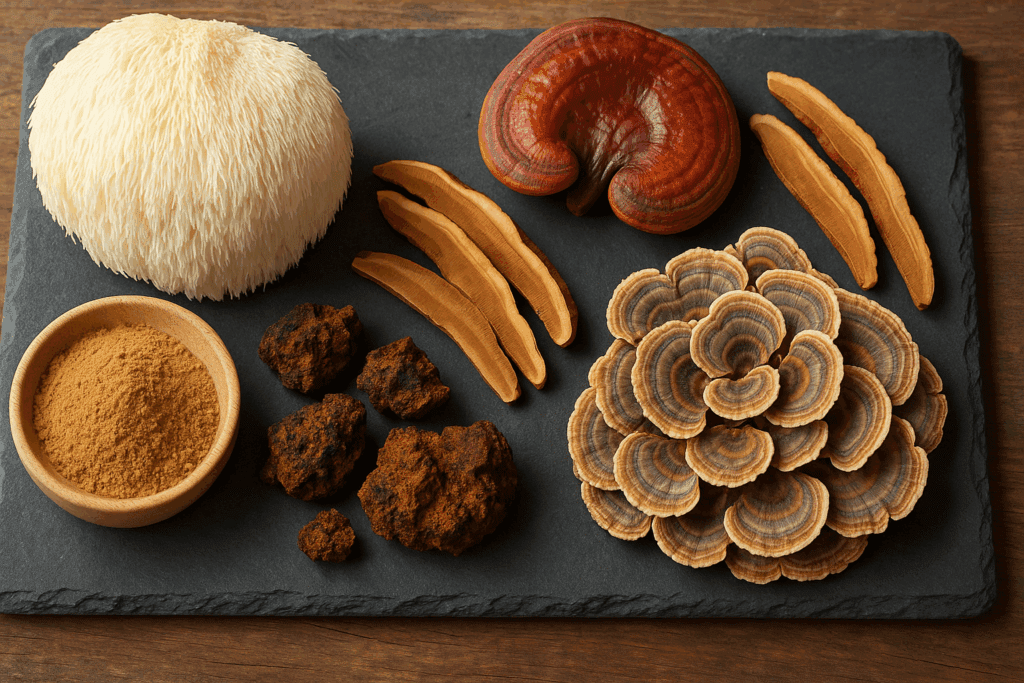
The Nutritional and Medicinal Value of Nootropic Mushrooms
Nootropic mushrooms are a class of fungi recognized for their ability to enhance cognitive performance, memory, and neurological health. Unlike synthetic nootropics, which often come with side effects or require prescriptions, these mushrooms are natural, food-based agents that work in harmony with the body. Among the most studied are lion’s mane (Hericium erinaceus), turkey tail (Trametes versicolor), reishi (Ganoderma lucidum), and chaga (Inonotus obliquus).
Lion’s mane is renowned for stimulating nerve growth factor (NGF) production, a key protein involved in neurogenesis and synaptic plasticity. Reishi, on the other hand, is known for its adaptogenic properties, helping to regulate stress responses that can impair cognition. Turkey tail boasts a diverse array of beta-glucans and polysaccharopeptides (PSP and PSK), which have been the subject of significant clinical interest for their immune-modulating and anticancer potential.
These mushrooms are typically consumed as extracts, powders, teas, or incorporated into functional foods and supplements. They offer a rich profile of nutrients including B-vitamins, minerals like selenium and zinc, and a wealth of bioactive compounds that work synergistically to promote both brain and prostate health. The dual impact on cognition and hormonal health is particularly appealing to middle-aged and older adults seeking holistic approaches to wellness.
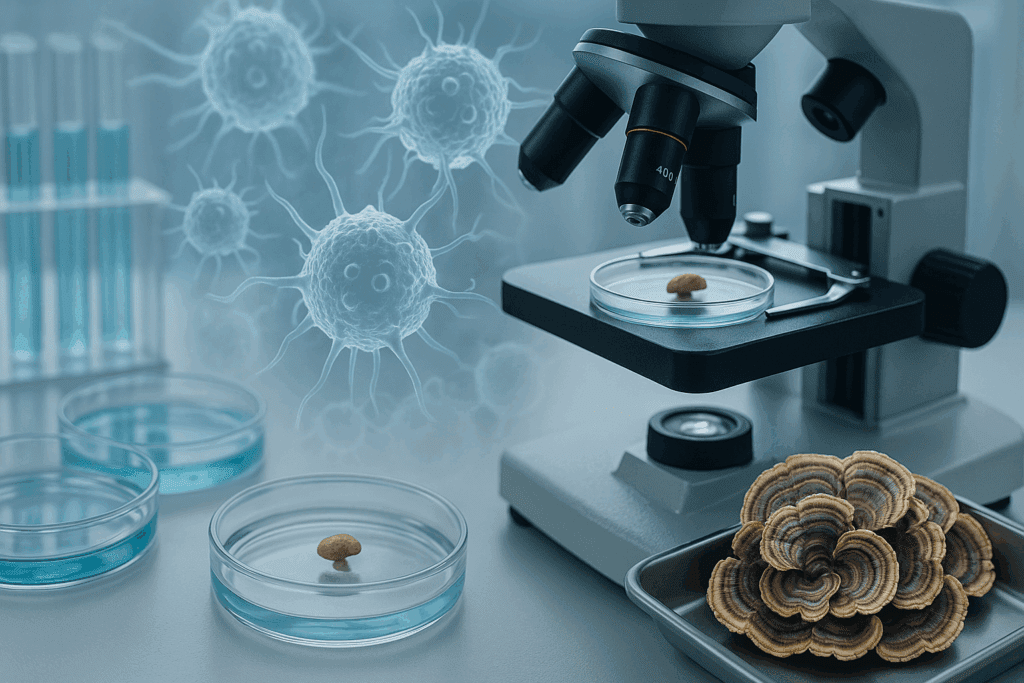
Scientific Insights Into Mushrooms for Prostate Cancer Support
The phrase “mushrooms for prostate cancer” has gained traction in the scientific community as researchers explore the adjunctive potential of these fungi. Among the most studied in this context is turkey tail mushroom, whose PSK (polysaccharide K) extract has been used in Japan as an adjuvant cancer therapy. Several studies have demonstrated that PSK may enhance immune system activity, increase natural killer cell function, and improve survival rates in certain cancer patients, including those with prostate cancer.
Lion’s mane also shows promise, though most of its research centers on its neurotrophic effects. However, preliminary findings suggest that its antioxidant and anti-inflammatory properties may also exert a protective effect on hormonal systems and reproductive organs. Reishi mushroom has shown in vitro efficacy against prostate cancer cells, with triterpenes that may inhibit cancer cell proliferation and induce apoptosis (programmed cell death).
While these findings are exciting, it is critical to emphasize that no mushroom has been proven to replace conventional treatments for prostate cancer. Instead, they may offer complementary support—particularly in mitigating treatment side effects, enhancing immune function, and improving quality of life. For example, some cancer patients report reduced fatigue and better stress management when supplementing with medicinal mushrooms under medical supervision.
Examining the Role of Mushrooms for Prostate Health Maintenance
Beyond the treatment context, mushrooms may play a preventive role in maintaining prostate health. Oxidative stress and chronic inflammation are key drivers of cellular damage in the prostate gland. Compounds found in reishi, chaga, and cordyceps have demonstrated potent antioxidant capabilities in laboratory settings, suggesting their potential role in neutralizing free radicals and reducing pro-inflammatory cytokines.
Moreover, zinc—a mineral essential for prostate function—is found in significant quantities in many mushrooms. This is especially relevant given that zinc deficiency has been associated with increased prostate cancer risk. By providing a dietary source of this crucial nutrient, functional mushrooms could support hormonal balance and cellular resilience in the prostate.
Dietary fiber, often overlooked in the context of prostate health, is also abundant in mushrooms. A high-fiber diet supports gut health, which in turn modulates systemic inflammation and hormonal metabolism. Given the interconnectivity between the gut microbiome and prostate health, incorporating mushrooms into one’s daily diet can be a strategic move toward overall wellness.
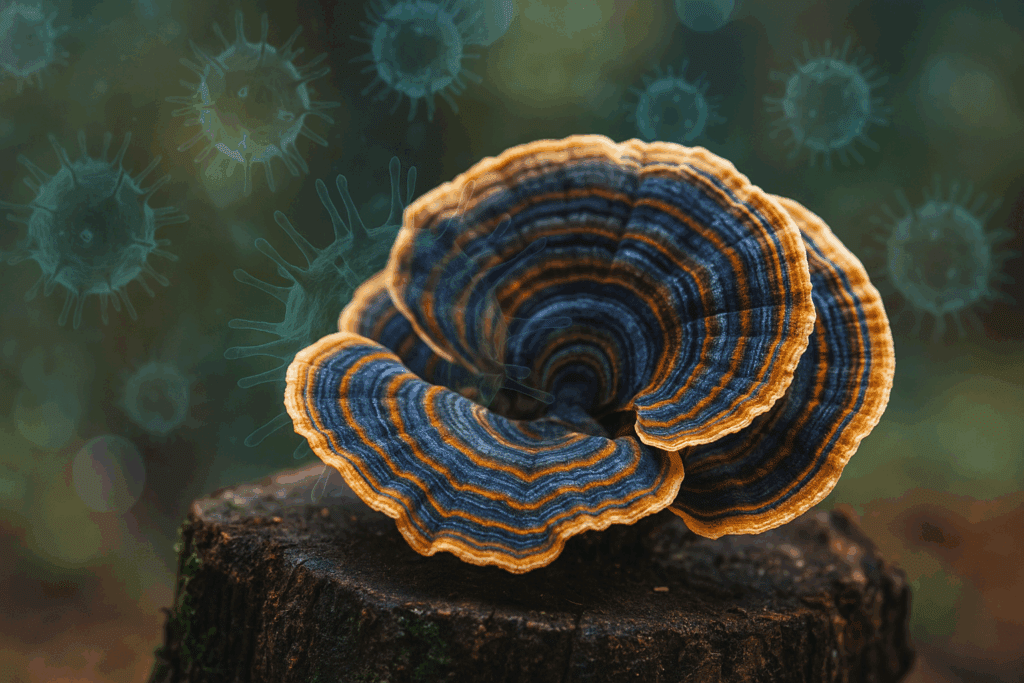
Turkey Tail Mushroom and Prostate Cancer: A Closer Look at the Evidence
Among all functional fungi, turkey tail mushroom stands out for its specific relevance to prostate cancer. The PSK extract derived from this mushroom has been studied extensively in the context of immune modulation and cancer support. In a randomized clinical trial, PSK was shown to prolong survival in patients with various types of cancers when used alongside chemotherapy. While direct research on turkey tail mushroom and prostate cancer is still emerging, its immunomodulatory effects offer compelling avenues for adjunctive therapy.
Turkey tail’s ability to activate macrophages, dendritic cells, and T-cells is of particular interest, as these immune cells are essential in recognizing and destroying malignant cells. Animal studies have suggested that turkey tail supplementation may slow the progression of tumor growth, though more robust clinical trials are needed to confirm these effects in humans.
Incorporating turkey tail into a cancer-supportive diet can be done through capsules, teas, or decoctions. As with all supplements, it is essential to consult a healthcare provider, particularly for individuals undergoing treatment for prostate cancer. This ensures safety, avoids potential interactions, and tailors interventions to individual health needs.

Cognitive Benefits of Nootropic Mushrooms in Cancer Recovery
Cancer and its treatments often take a toll on cognitive function—a condition sometimes referred to as “chemo brain.” Nootropic mushrooms like lion’s mane offer promising strategies to counteract these effects. By promoting nerve regeneration and reducing oxidative stress in the brain, lion’s mane may support mental clarity, memory, and emotional well-being during cancer recovery.
Chronic stress, depression, and anxiety are also common among prostate cancer survivors. Adaptogenic mushrooms like reishi can help stabilize cortisol levels and promote a balanced stress response, which is vital for long-term brain health. Cordyceps, another medicinal mushroom, has shown promise in improving energy metabolism and mitochondrial function, both of which are often impaired in cancer patients.
These benefits are not merely anecdotal; clinical trials are beginning to validate the use of nootropic mushrooms for cognitive recovery in cancer care settings. While more research is needed, especially in the context of prostate cancer, the initial evidence underscores the interconnectedness of brain and hormonal health—and the potential role of functional fungi in nurturing both.
How Mushrooms for Prostate Cancer Fit Into Integrative Medicine
Integrative medicine emphasizes a holistic approach that combines conventional treatments with evidence-based complementary therapies. Within this framework, mushrooms for prostate cancer are increasingly viewed not as alternatives, but as supportive agents that can enhance the efficacy and tolerability of standard oncology treatments.
For example, medicinal mushrooms may help counteract chemotherapy-induced immunosuppression by bolstering white blood cell production and reducing inflammation. Their antioxidant properties may also protect healthy tissues from the collateral damage of radiation therapy. Meanwhile, their mood-stabilizing effects can aid in managing the psychological burden of a cancer diagnosis.
This multifaceted support aligns well with the principles of integrative oncology, which seeks to optimize quality of life, improve patient outcomes, and empower individuals to take an active role in their healing journey. When used judiciously and in collaboration with medical professionals, medicinal mushrooms can be a valuable addition to comprehensive cancer care plans.
Practical Strategies for Incorporating Functional Mushrooms Into Daily Life
Incorporating functional mushrooms into one’s lifestyle does not have to be complicated. Culinary mushrooms like shiitake and maitake can be easily added to soups, stir-fries, and salads, providing both flavor and nutritional value. For more concentrated benefits, mushroom powders and extracts can be blended into smoothies, coffee, or even baked goods.
For those targeting prostate health specifically, mushroom supplements standardized for key compounds like beta-glucans and triterpenes are widely available. It is important to select products that have undergone third-party testing for quality and purity, as the supplement industry is not uniformly regulated.
Combining mushroom intake with other health-promoting behaviors—such as regular physical activity, a balanced diet rich in fruits and vegetables, and stress-reduction practices like meditation—can amplify their benefits. The goal is not to rely solely on any single intervention, but to create a synergistic lifestyle that supports both brain and prostate health.
Potential Interactions and Safety Considerations
While functional mushrooms are generally considered safe for most people, it is essential to be aware of potential interactions with medications and underlying health conditions. For example, mushrooms that affect the immune system may not be suitable for individuals on immunosuppressive drugs. Additionally, those with mushroom allergies or sensitivities should exercise caution.
Certain compounds in mushrooms may also influence blood clotting or interact with hormone-related treatments, which is particularly relevant for prostate cancer patients. This underscores the importance of consulting a healthcare professional before beginning any new supplement regimen, especially in the context of chronic disease management or cancer care.
Overall, when used responsibly and in conjunction with medical advice, medicinal mushrooms represent a low-risk, high-potential intervention for enhancing both mental clarity and prostate resilience. Ongoing research will continue to refine our understanding of their mechanisms and applications, paving the way for more personalized and effective integrative therapies.
The Future of Nootropic Mushrooms for Prostate Cancer and Brain Health
The future of functional fungi in healthcare is both exciting and complex. As research evolves, we are likely to see more targeted studies exploring the role of mushrooms for prostate cancer, particularly in combination with conventional therapies. Advances in biotechnology may also lead to the development of mushroom-derived pharmaceuticals, offering standardized doses of active compounds for clinical use.
At the same time, public awareness and accessibility are expected to grow, making these natural remedies a more integral part of mainstream health practices. Educational efforts, quality control standards, and cross-disciplinary collaboration between mycologists, oncologists, and nutritionists will be essential in ensuring safe and effective use.
Importantly, the conversation around mushrooms is shifting—from one of folklore to one grounded in empirical evidence and personalized health strategies. This shift reflects a broader trend in medicine: the recognition that the mind and body are deeply interconnected, and that sustainable healing requires a multifaceted, integrative approach.
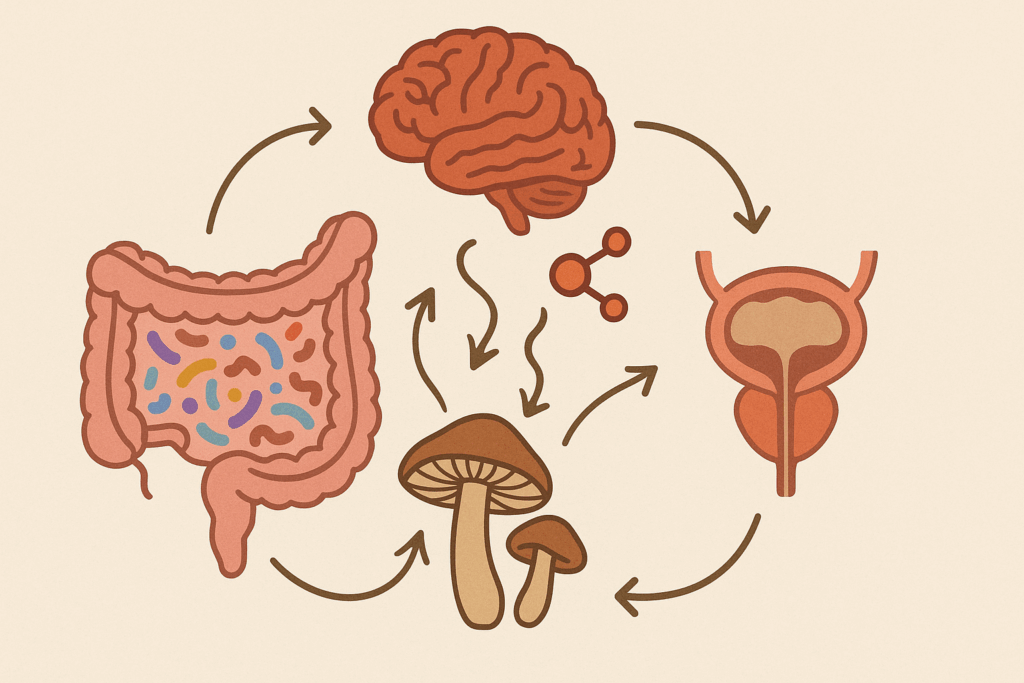
The Synergistic Role of Gut Health in Brain and Prostate Function
Modern research continues to illuminate the intricate relationship between the gut microbiome and overall health—especially in the domains of cognition and hormonal regulation. While it may seem unrelated at first glance, the state of one’s gut flora can exert profound effects on both brain function and prostate wellness. This axis, commonly referred to as the gut-brain-prostate connection, highlights how microorganisms in the digestive tract can influence neurological processes, immune responses, and even hormonal equilibrium.
The beneficial compounds found in medicinal mushrooms—such as beta-glucans and prebiotic fibers—support the growth of beneficial gut bacteria like Lactobacillus and Bifidobacterium. These microorganisms, in turn, produce short-chain fatty acids and neurotransmitter precursors that help regulate inflammation and oxidative stress, two major contributors to both prostate disease and cognitive decline. Lion’s mane mushroom, for instance, not only promotes nerve regeneration but also contains compounds that may act as prebiotics, creating a nurturing environment for healthy gut flora.
Furthermore, a balanced gut microbiome helps metabolize and regulate estrogens and androgens, which are critical in maintaining prostate health. Disruptions in gut flora, often caused by poor diet or antibiotic overuse, can lead to an accumulation of harmful estrogen metabolites, which may contribute to hormonal imbalances and increase the risk of prostate complications. Medicinal mushrooms, through their anti-inflammatory and gut-supportive properties, offer a dual mechanism that reinforces both neurological and urological stability.
From a practical standpoint, incorporating functional mushrooms into the diet alongside fermented foods such as kimchi, kefir, or sauerkraut can maximize these synergistic effects. This dietary strategy not only supports cognitive vitality and hormonal balance but also promotes immune resilience, setting the foundation for long-term, integrative health benefits.
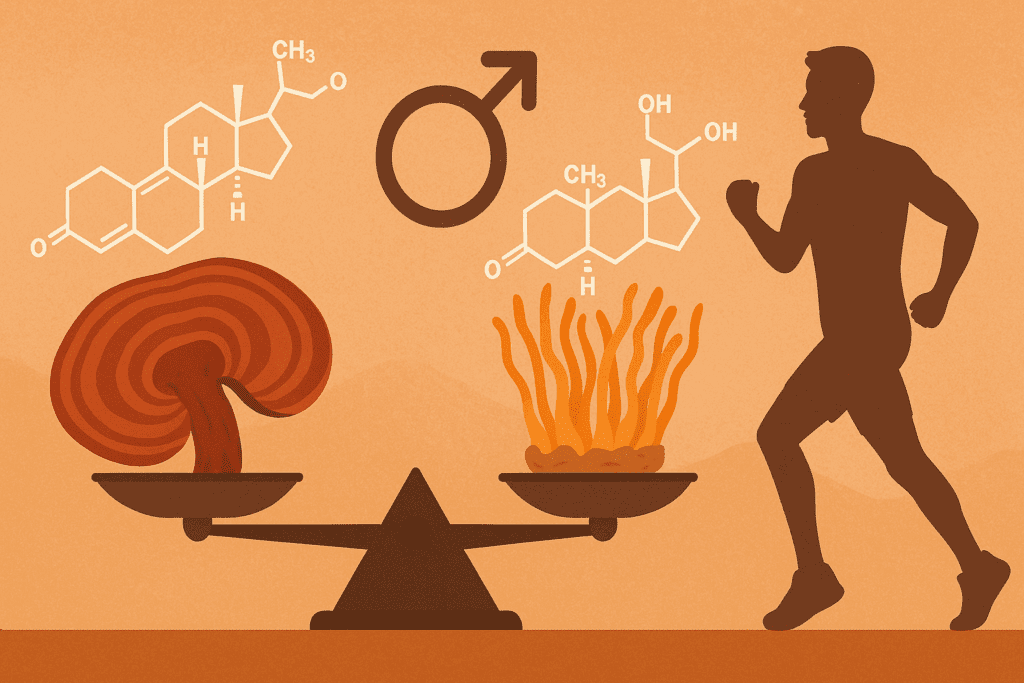
Investigating Hormonal Balance and Mushroom Adaptogens in Men’s Health
Hormonal balance is a cornerstone of male health, influencing everything from mood and energy to libido and prostate integrity. As men age, fluctuations in testosterone and other sex hormones can contribute to a cascade of physiological changes, including increased susceptibility to prostate issues and cognitive fog. In this context, adaptogenic mushrooms such as reishi and cordyceps offer a particularly compelling set of benefits that bridge hormonal stability with mental clarity.
Reishi mushroom has been traditionally revered for its ability to calm the nervous system and support endocrine regulation. Recent studies suggest that reishi may influence androgen receptor activity and modulate the hypothalamic-pituitary-adrenal (HPA) axis, which governs stress hormone output. By maintaining a balanced cortisol rhythm, reishi helps buffer the impact of chronic stress—a known disruptor of testosterone production and neurological health. This makes reishi a potent ally not only for emotional well-being but also for preserving healthy prostate function in the face of life’s ongoing pressures.
Cordyceps, another adaptogen with deep roots in traditional medicine, is gaining popularity for its effects on stamina, libido, and metabolic health. It appears to enhance ATP production and oxygen utilization, potentially supporting better circulation and hormonal signaling. Some early evidence also indicates cordyceps may indirectly promote testosterone synthesis by reducing systemic inflammation and improving mitochondrial efficiency in Leydig cells, the primary producers of testosterone in men.
When combined with nootropic mushrooms such as lion’s mane and antioxidant-rich fungi like chaga, these adaptogens create a multidimensional approach to male health. Rather than targeting a single symptom or system, they work together to harmonize the body’s stress response, boost cognitive performance, and fortify the prostate against inflammation and cellular aging. This integrative synergy is especially relevant for men in midlife and beyond, who often seek natural solutions that address both mind and body in a unified, holistic manner.
FAQ: Exploring the Advanced Science of Mushrooms for Prostate Cancer and Brain Health
1. How do mushrooms for prostate cancer support immune resilience beyond antioxidant effects?
While antioxidants in mushrooms help reduce oxidative stress, the real power lies in their immunomodulatory actions. Compounds like beta-glucans from turkey tail mushroom stimulate macrophage activity and enhance the proliferation of natural killer cells, both of which play crucial roles in tumor suppression. Moreover, these polysaccharides can reprogram immune cells to recognize and eliminate abnormal prostate tissue before it proliferates into malignancy. Unlike conventional antioxidants, these compounds work systemically, reinforcing immune vigilance in both mucosal and systemic immunity. This dual-action makes mushrooms for prostate cancer a promising tool in both preventative and supportive care frameworks.
2. Can nootropic mushrooms influence hormonal balance related to prostate function?
Yes, certain mushrooms like reishi and cordyceps exhibit adaptogenic properties that indirectly affect hormone regulation. By modulating the hypothalamic-pituitary-adrenal (HPA) axis, these fungi help regulate cortisol levels, which when chronically elevated, can suppress testosterone production. Additionally, reishi contains triterpenoids that interact with androgen receptors, potentially reducing dihydrotestosterone (DHT) levels—a hormone linked with prostate enlargement and cancer progression. These actions not only support mental clarity but also contribute to hormonal environments that deter prostate dysfunction. Therefore, nootropic mushrooms have more expansive benefits than just cognitive enhancement.
3. What distinguishes turkey tail mushroom and prostate cancer research from other mushrooms?
Among medicinal fungi, turkey tail mushroom has the most rigorous human clinical research linking it with immune function in cancer patients. Its active compound, PSK, has been approved in Japan as a complementary cancer therapy and has demonstrated statistically significant improvements in survival across several cancer types. Specific to prostate cancer, PSK has shown the ability to upregulate tumor-infiltrating lymphocytes, which are critical in the body’s fight against tumor growth. This makes turkey tail mushroom and prostate cancer a particularly well-researched pairing with promising translational applications. The mushroom’s ability to amplify the body’s natural immune surveillance mechanisms adds a unique layer of therapeutic potential.
4. How do mushrooms for prostate health affect metabolic functions?
Beyond immune and hormonal benefits, mushrooms contribute significantly to metabolic health—a critical but often overlooked aspect of prostate wellness. Functional mushrooms like shiitake and maitake can help regulate lipid profiles, reducing LDL cholesterol levels and improving blood glucose regulation. These effects indirectly benefit prostate health by minimizing systemic inflammation and vascular congestion, which are risk factors for both benign and malignant prostate conditions. Additionally, metabolic health supports efficient androgen metabolism, which further influences prostate size and function. Incorporating these mushrooms into a balanced diet can provide a multidimensional approach to men’s health.
5. Can medicinal mushrooms reduce treatment side effects in prostate cancer patients?
Emerging clinical observations suggest that medicinal mushrooms can alleviate some of the common side effects associated with chemotherapy and radiation in prostate cancer patients. For instance, lion’s mane may help mitigate “chemo brain,” the cognitive fog often reported during cancer therapy. Reishi and turkey tail have also been linked with reduced fatigue and improved mood stabilization, offering psychological benefits during recovery. These effects may be attributed to their combined antioxidant, anti-inflammatory, and neuroprotective mechanisms. Thus, mushrooms for prostate cancer could serve as supportive interventions that enhance patient quality of life during conventional treatment protocols.
6. How should turkey tail mushroom be dosed for prostate cancer support?
There is no one-size-fits-all dosing guideline, but most clinical studies use 3 to 6 grams of dried turkey tail extract daily, often standardized to a specific beta-glucan or PSK content. It’s important that individuals use standardized extracts from reputable suppliers to ensure consistency in bioactive compound levels. Clinical practitioners often recommend splitting the dosage throughout the day to maintain steady immune modulation. For optimal results, turkey tail mushroom and prostate cancer protocols should always be customized in consultation with a healthcare provider, especially when used alongside immunotherapies or hormone-based treatments. This ensures safety and maximizes therapeutic efficacy.
7. What is the role of mushrooms in reducing psychological distress related to prostate disease?
Prostate disorders, especially cancer, can induce considerable psychological strain, including anxiety, depression, and reduced self-esteem. Nootropic mushrooms like lion’s mane promote neurogenesis and mood regulation through their impact on the hippocampus and prefrontal cortex. Reishi helps stabilize emotional volatility by modulating stress hormones such as cortisol. Combined, these effects help buffer the psychological burden of prostate illness, offering a form of natural emotional resilience. The mental health benefits make mushrooms for prostate health not only physiological but also psychosocial interventions.
8. Do mushrooms for prostate health support sexual function and energy?
Yes, particularly mushrooms like cordyceps and maca (technically a root but often discussed alongside mushrooms) show benefits in enhancing libido, erectile function, and stamina. Cordyceps is known to improve ATP production and oxygen utilization, which are foundational to physical energy and performance. Improved blood flow and mitochondrial health translate into better prostate perfusion, supporting glandular vitality. While not a replacement for targeted sexual health treatments, these mushrooms provide ancillary support that complements other interventions. Their adaptogenic nature means they work gradually but sustainably, reinforcing foundational health systems.
9. Are there biotech innovations enhancing mushrooms for prostate cancer therapies?
Yes, a growing number of biotech firms are isolating and synthesizing specific mushroom compounds for targeted cancer therapies. For example, researchers are developing nano-encapsulated forms of PSK to enhance bioavailability and tissue targeting. Others are engineering mushroom-derived compounds to bind selectively with prostate cancer cells, making drug delivery more efficient and less toxic. These technologies are still in experimental phases but hold great promise in advancing mushrooms for prostate cancer beyond traditional supplementation. The convergence of natural medicine and biotechnology is likely to redefine the therapeutic landscape.
10. How do sociocultural attitudes influence the adoption of mushrooms for prostate health?
Cultural beliefs play a significant role in how individuals perceive the value of medicinal mushrooms. In Eastern medicine systems, these fungi are deeply revered and commonly integrated into daily wellness practices. In contrast, Western societies are just beginning to embrace their potential, often viewing them with skepticism unless backed by clinical trials. This cultural lag affects how quickly mushrooms for prostate health gain mainstream acceptance in the West. Education, accessibility, and regulatory approval will be key in closing this gap and unlocking their full public health potential.
Conclusion: Embracing the Dual Power of Mushrooms for Prostate Cancer and Cognitive Vitality
The growing body of evidence supporting mushrooms for prostate cancer and brain health is both promising and inspiring. As we deepen our understanding of how these functional fungi work, we uncover new possibilities for enhancing well-being across the lifespan. From the immune-boosting properties of turkey tail to the neuroregenerative effects of lion’s mane, medicinal mushrooms offer a unique blend of benefits that align perfectly with the goals of integrative medicine.
Incorporating these mushrooms into a daily wellness routine may provide a valuable layer of support for men concerned about both cognitive decline and prostate health. While they are not miracle cures, their ability to modulate inflammation, support hormonal balance, and enhance mental clarity makes them worthy of consideration in any comprehensive health strategy.
As always, informed and responsible use—guided by scientific evidence and medical advice—is key. By embracing the potential of these remarkable organisms, we can move toward a more holistic, empowered, and personalized model of health. The synergy between brain and body is undeniable, and mushrooms may very well be one of nature’s most powerful tools for nurturing both.
